An Interview with Julius Caesar
£3.00
This lesson includes writing a newspaper report for The Briton Daily News about Caesar’s attempt to invade Britain in 55 BC. The information for this report is gained from an interview with Caesar himself.
Caesar had personal reasons of his own for invading Britain which are covered in this lesson as well as the reasons why Rome would benefit from the invasion.
As well as English (writing a newspaper report) and history skills the Evidence-Based Learning skills developed in this lesson include independent learning, peer and self-assessment. This lesson also offers pupils the opportunity to master collaborative learning.
Description
Each evidence-based learning (EBL) Roman history resource in this set is a complete lesson which uses the history curriculum as a framework through which each of the eight EBL skills can be mastered. Each resource has “mastering” one EBL skill as its central focus and all eight EBL skills are covered more than once in these lessons.
All eight EBL skills are better gained working with a partner so much of the work in these lessons is collaborative. These resources will ensure that pupils can master and use EBL skills regardless of their ability.
Each Roman history lesson will develop a single EBL skill through:
1) A “Before You Start” page that introduces the EBL skill.
2) Opportunities to master this skill during the lesson.
3) An “After You Finish” page that offers pupils the chance to evaluate their learning experience (of the lesson and the EBL skill) and to identify their next step in using the EBL skill.
The skills in bold below are all the EBL skills developed in this Roman lesson. Click on each skill to learn more about that skill.
- Collaboration
- Thinking Skills
- Peer Assessment
- Peer Teaching
- Self-Assessment
- Metacognition
- Self-Regulation
- Independent Learning
1 review for An Interview with Julius Caesar
Only logged in customers who have purchased this product may leave a review.
Related products
-


Caesar Sails Without his Cavalry
£3.00 Add to basket £3.00Add to basket
£3.00Add to basketJulius Caesar invaded Britain but the Britons were waiting for him. This lesson recaps the start of this invasion in 55 BC.
As well as English and history skills the Evidence-Based Learning skills developed in this lesson includes thinking skills. This lesson also offers pupils the opportunity to master collaborative learning.
VIEW -


Caesar Sails Back to Gaul
£3.00 Add to basket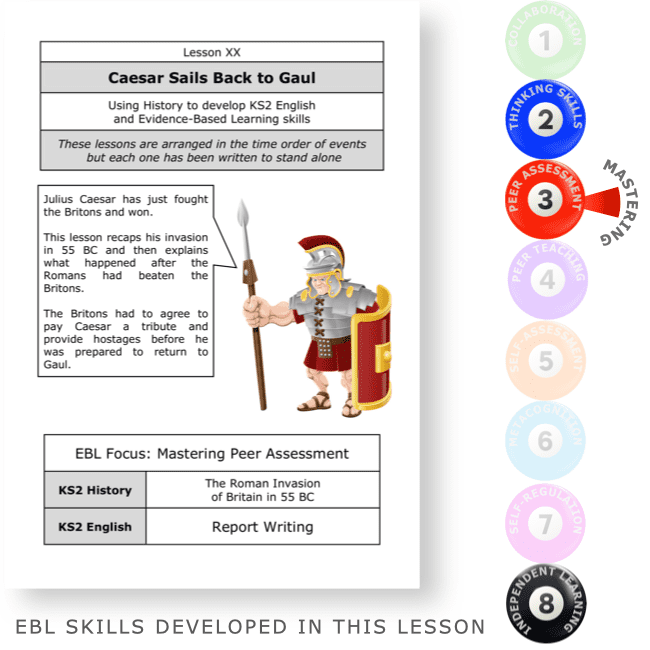 £3.00Add to basket
£3.00Add to basketJulius Caesar has just fought the Britons and won. This lesson recaps his invasion in 55 BC and then explains what happened after the Romans had beaten the Britons. The Britons had to agree to pay Caesar a tribute and provide hostages before he was prepared to return to Gaul.
As well as English (writing a report) and history skills the Evidence-Based Learning skills developed in this lesson include independent learning and thinking skills. This lesson also offers pupils the opportunity to master peer assessment.
VIEW -
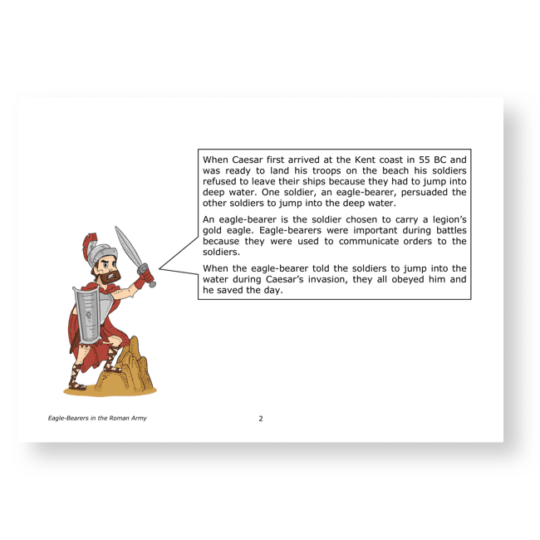
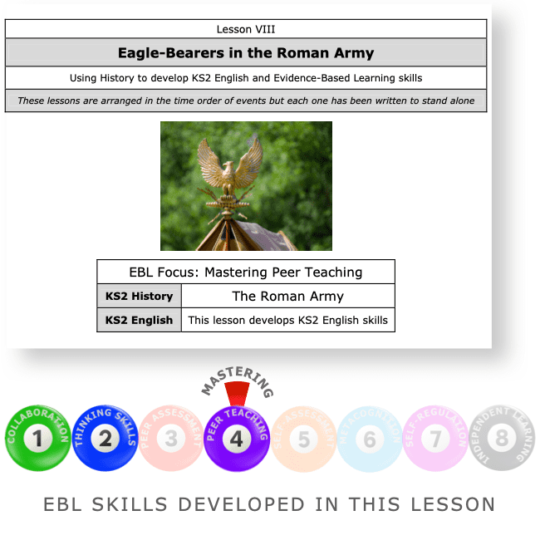
Eagle-Bearers in the Roman Army
£3.00 Add to basket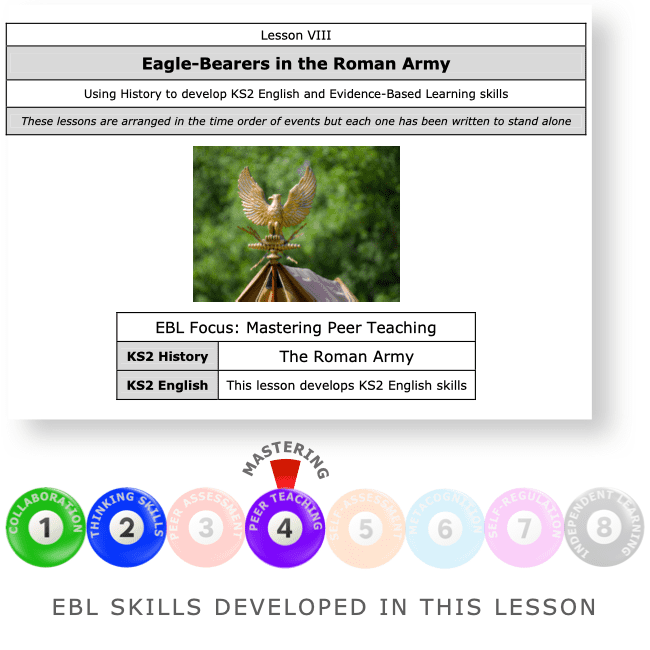 £3.00Add to basket
£3.00Add to basketWhen Caesar first arrived at the Kent coast in 55 BC and was ready to land his troops on the beach his soldiers refused to leave their ships because they had to jump into deep water. One soldier, an eagle-bearer, persuaded the other soldiers to jump into the deep water.
An eagle-bearer is the soldier chosen to carry a legion’s gold eagle. Eagle-bearers were important during battles because they were used to communicate orders to the soldiers. When the eagle-bearer told the soldiers to jump into the water during Caesar’s invasion, they all obeyed him and he saved the day.
As well as English and history skills the Evidence-Based Learning skills developed in this lesson include collaborative learning and metacognition. This lesson also offers pupils the opportunity to master peer teaching.
VIEW -

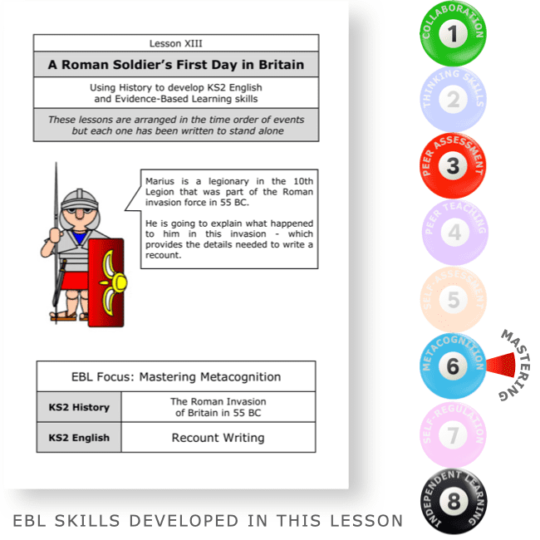
A Roman Soldier’s First Day in Britain
£3.00 Add to basket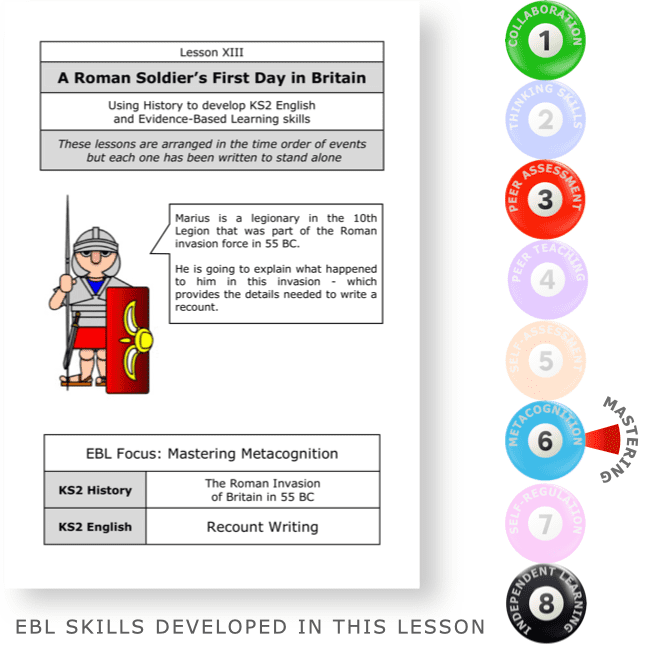 £3.00Add to basket
£3.00Add to basketMarius is a legionary in the 10th Legion that was part of the Roman invasion force in 55 BC. He is going to explain what happened to him in this invasion – which provides the details needed to write a recount.
As well as English (writing a recount) and history skills the Evidence-Based Learning skills developed in this lesson include collaborative learning, peer assessment and independent learning. This lesson also offers pupils the opportunity to master metacognition.
VIEW

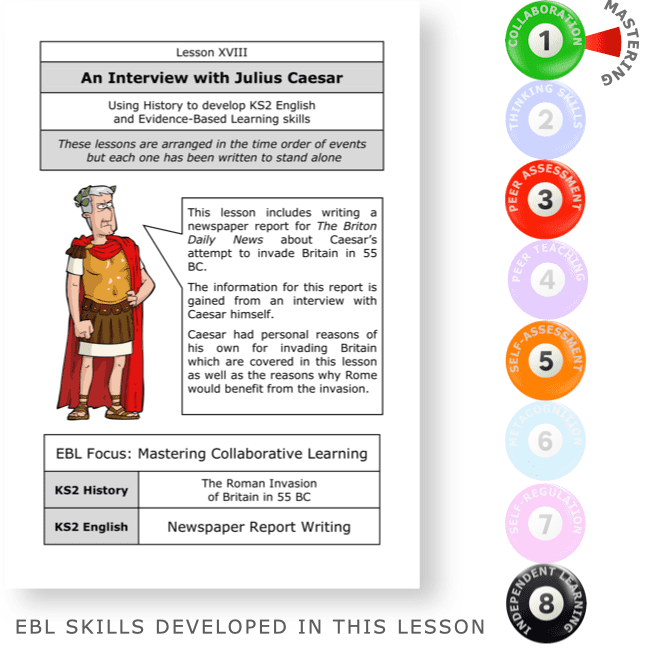
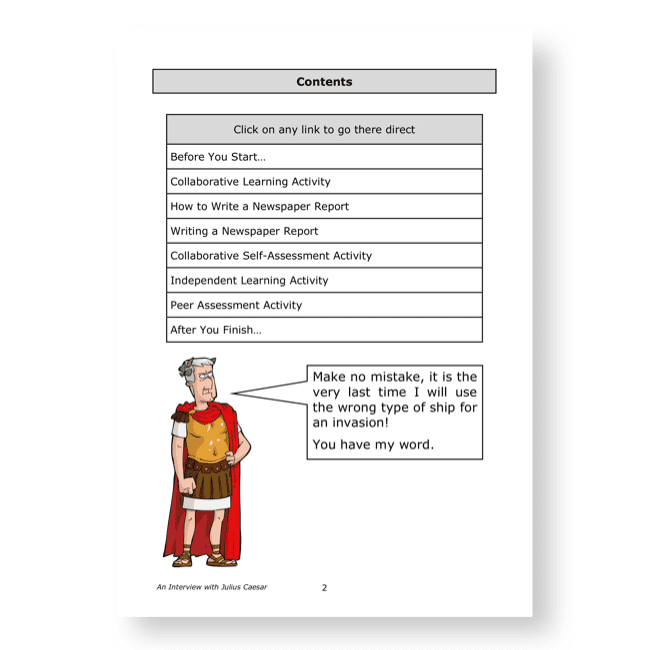
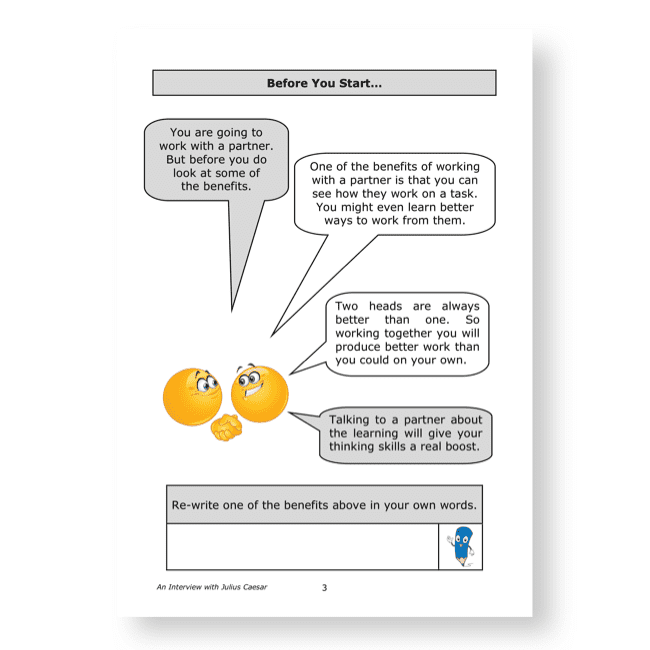
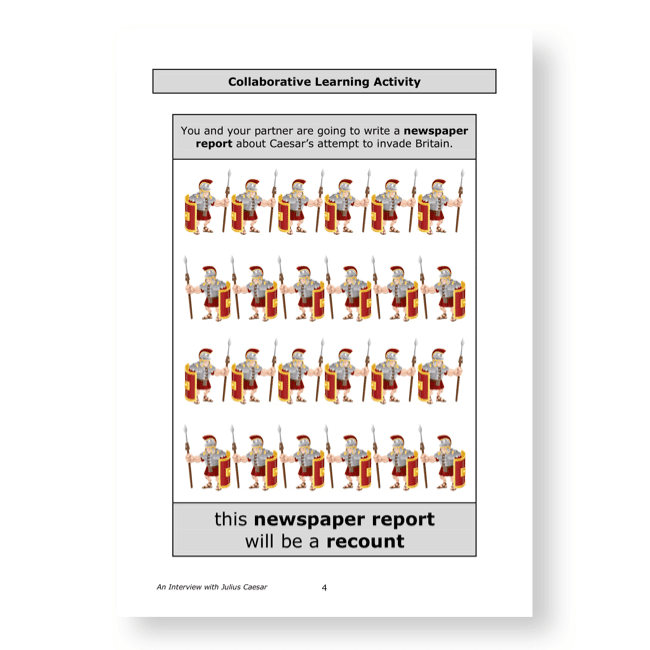
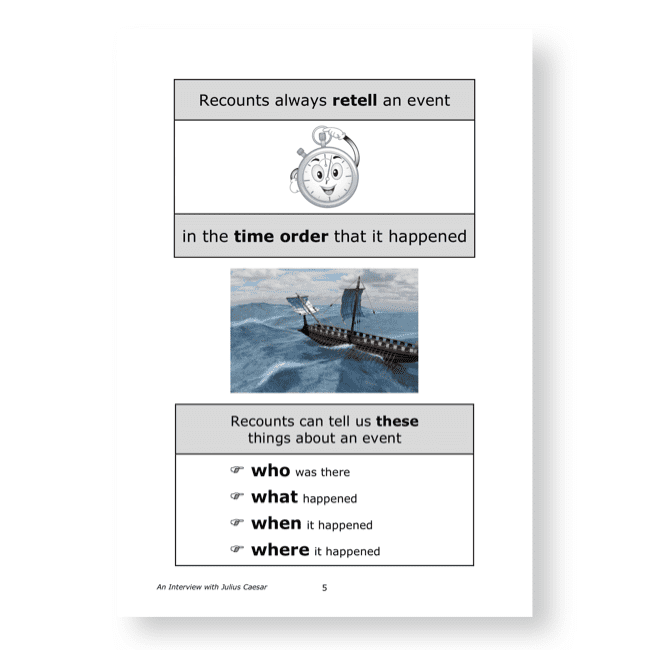
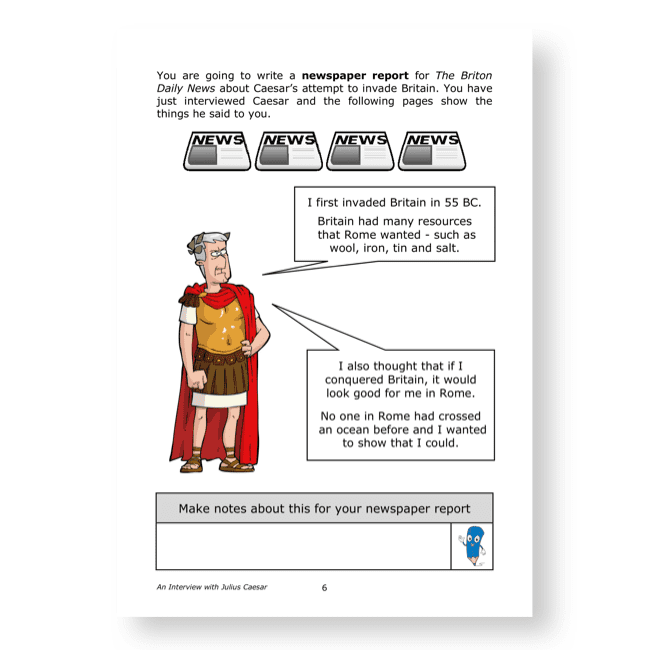
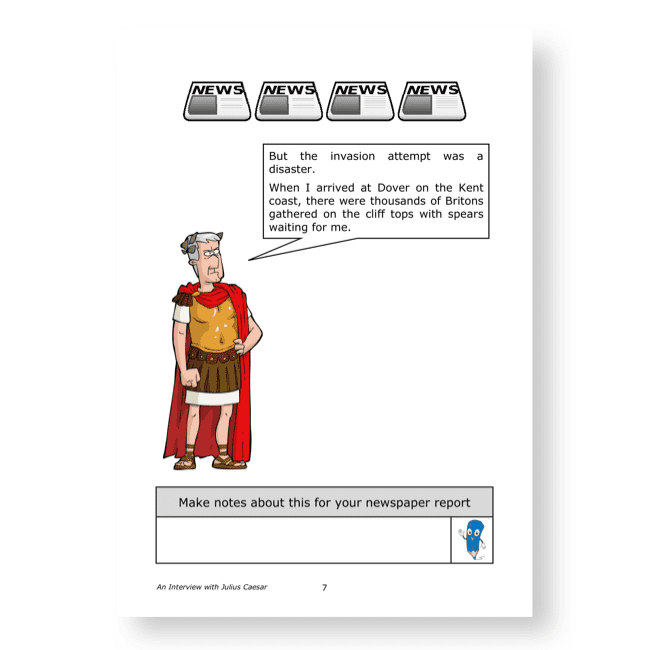
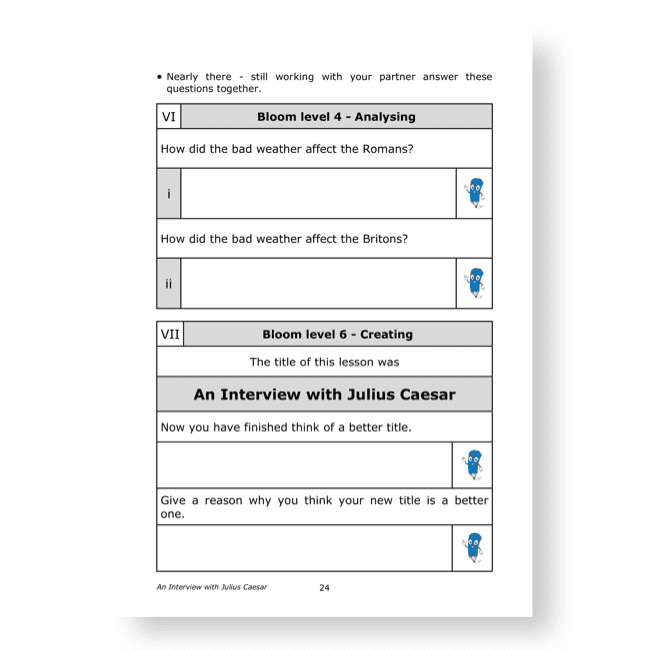
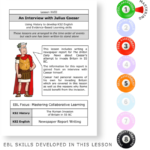
Philipem (verified owner) –
We asked a.i. to review this lesson. This is what it said:
Teaching Multiple Skills with One Engaging Lesson
Are you looking for a lesson that allows your upper KS2 students (years 5 and 6) to develop skills across multiple subjects in an engaging way? The lesson “An Interview with Julius Caesar” from the Romans series is a fantastic option.
This 18th lesson in the 25-lesson set seamlessly combines the teaching of English skills (writing a newspaper report), history knowledge about the Roman invasion of Britain, and crucial evidence-based learning (EBL) skills like collaboration, independent learning, peer assessment, and self-assessment.
The central activity has students working in pairs to write a newspaper report from the perspective of ancient reporters interviewing Julius Caesar himself about his invasion attempt in 55 BC. Not only do they get to practise the newspaper writing genre, but they also learn key details about this pivotal historical event, like Caesar’s motivations and the dramatic events of the invasion as it unfolded.
But that’s not all. The lesson also focuses on mastering the EBL skill of collaborative learning through structured partner activities. Students reflect on the benefits of collaboration and assess how well they worked with their partner. Additional activities reinforce independent learning and the ability to give and receive constructive feedback through peer assessment.
By scaffolding the development of one core EBL skill in each lesson, the Romans series helps students build essential skills for future success. The engaging topic of the Roman invasion provides fantastic real-world context for practising these skills.
If you want to hit multiple learning targets in one richly contextual lesson, I highly recommend giving “An Interview with Julius Caesar” a try. I rate it ⭐⭐⭐⭐⭐ for its skilful integration of curriculum areas and focus on evidence-based pedagogical practices.